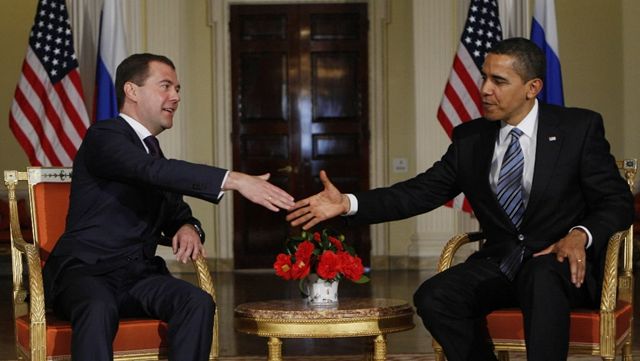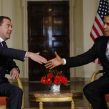
Moscow Ponders “Strategy” in the “Reset”
By:

Ahead of US President, Barack Obama, meeting his Russian counterpart, Dmitry Medvedev, in Washington on June 24, Moscow-based analysts have considered the progress of the “reset.” In two recent articles in Nezavisimoye Voyennoye Obozreniye, Sergey Rogov, Director of the USA and Canada Institute assessed the evolution of US-Russian relations. Although he concluded that the “window of opportunity” is open, he implied that the relationship remains virtual rather than real: “If the achievements of the past year are successfully nailed down and serious progress is made in new spheres, the Russian-American partnership can finally turn from declarations into reality” (Nezavisimoye Voyennoye Obozreniye, June 11). However, as Rogov traced the achievements of the “reset,” it is worth noting that his conceptual approach was to firmly blame Washington for previous problems in bilateral ties.
In Rogov’s view, since the mid-1990’s, Washington had presented Moscow with a fait accomplis at the latter’s expense. NATO enlargement, unilateral withdrawal from the 1972 ABM Treaty, efforts to weaken Russian influence within the CIS, and unilateral use of military force contrary to international law, were examples of US unwillingness to build constructive relations with Russia. Rogov “overlooked” any instances of Russian foreign and security policy contributing to such difficulties. Proceeding from this stance, he delineated six achievements in the “reset,” to date:
1. Washington has abandoned its “paternalistic tone towards Moscow.” Anti-Russian rhetoric has given way to a more positive style: the Obama administration listens to Moscow and refuses to ignore its concerns.
2. A new START Treaty was signed this year, which imposes “no unilateral concessions on Russia,” and instead allows the maintenance of the balance of strategic nuclear forces by preserving an approximate parity at a lower level. Developing an arms control regime, he asserts, paves the way to build other “forms and methods of maintaining strategic stability in the multipolar world of the 21st century.”
3. The Obama administration has canceled or frozen the Ballistic Missile Defense (BMD) plans advanced by the previous administration and pursues a regional BMD instead. “Consequently, the model of mutual nuclear deterrence, which Washington tried with fervor to break in the last decade, will be preserved,” he suggested.
4. Although NATO enlargement to include Georgia and Ukraine has not been abandoned, it has given way to laying greater emphasis upon building military cooperation with Russia.
5. Washington refuses to “recognize the CIS as a zone of Russia’s ‘privileged interests,’” while avoiding confrontation over the issue. He noted that Washington reacted coolly to the change of government in Kyiv and the subsequent Russian-Ukrainian rapprochement.
6. The US House of Representatives hearings to consider repealing the Jackson-Vanik amendment, resuming cooperation over nuclear technologies, and unconditionally lifting US sanctions against Rosoboroneksport and MAI (Moscow Aviation Institute) has contributed to improved economic relations (Nezavisimoye Voyennoye Obozreniye, June 11).
Rogov highlighted the level of cooperation reciprocated by Moscow over Afghanistan and Iran. Equally, he pointed to only achieving a working cooperative approach on such issues, since a common stance on these remains a long way off. As the “reset” continues, he acknowledged it faces domestic criticism from the Republican Party, as well as externally by Baltic and Eastern or Central European NATO members. Rogov also tied the future pursuit of the policy to practical progress on BMD cooperation: “Only if the BMD problem turns from a source of conflict into a sphere of cooperation will relations between Washington and Moscow become genuinely stable and long-term” (Nezavisimoye Voyennoye Obozreniye, June 11).
Referring to the recently leaked foreign policy document in Moscow, that floated the idea of pursuing closer relations with the West, Dmitry Trenin, Director of the Carnegie Moscow Center, stressed additional “rapprochement” indicators ranging from Russian-Polish relations to the “reset.” The image of Prime Minister, Vladimir Putin, kneeling at the memorial to Polish officers murdered by Stalin’s regime in 1940 at Katyn, or the presence of NATO troops on Red Square during the May 9 Victory Day parade may have been symbolic, but indicated that Moscow is striving for closer relations with the West. Nonetheless, Trenin echoed Rogov’s concern that the “reset” must not be allowed to become purely virtual. He linked the real test to the extent that Washington might support President, Dmitry Medvedev, in his attempts to modernize the Russian economy, while identifying that the modernization agenda is currently too narrowly focused. “Within a few years, when it becomes clear to the Russian leadership that modernization conceived as technological innovation is too narrow to succeed, important choices will have to be made. Either the scope of modernization will be broadened, or modernization will be aborted in favor of regime preservation. Forward-looking elements in Russia will require compelling arguments if their case is to prevail,” Trenin argued (The Moscow Times, June 4).
In an effort to tie the “reset” to a more identifiable basis that might offer a durable understanding on the future course or limits of the policy, in a lengthy article in Nezavisimoye Voyennoye Obozreniye, Rogov assessed the differences between the US National Security Strategy of the Obama administration and his predecessor. Noting the declarative element of the strategy and linking it to other doctrinal documents (US Quadrennial Defense Review, the Nuclear Policy Review, the Missile Defense Policy Review, the Cyber Security Policy Review), Rogov described it as an “open presentation of the policy priorities of the American leadership.” He considered its innovations in terms of security, economic prosperity, promotion of “universal values” and strengthening the role of the US in the international order (Nezavisimoye Voyennoye Obozreniye, June 17).
Rogov identified the absence of the term “mulipolar world,” as the document highlights Washington’s interest in interaction with key NATO allies (UK, France and Germany). It also refers to Japan, South Korea, Australia and others. He then considered the absence of any reference in the current strategy to NATO “expansion” or imparting “global functions” to the Alliance. New “centers of influence” that must become a greater focus for interaction were mentioned in the same order throughout the document: China, India and Russia. Rogov implied that Washington has already downgraded the strategic importance it attaches to its ties with Russia, and made a point of noting the other centers of “regional influence” listed in the strategy: “including Brazil, Indonesia, South Africa, Saudi Arabia, Nigeria, and Kenya” (Nezavisimoye Voyennoye Obozreniye, June 17).
While the US National Security Strategy acknowledges the return of Russia to the international arena and that it is “speaking with a stronger voice,” Rogov said it placed prime importance on nuclear weapons reduction and that Washington intends “to build stable, substantive, multidimensional relations with Russia, based on common interests.” However, he then stressed several ambiguities. For instance, the strategy asserts that the Obama administration “supports efforts within Russia to promote the rule of law, accountable government, and universal values,” which Rogov perceived as implying “that Russia does not fully meet the criteria of a democratic state.” These issues are singled out as important, since the new US National Security Strategy “will continue to be the fundamental doctrinal document of the US at least until 2013” (Nezavisimoye Voyennoye Obozreniye, June 17).
Russian analysis of the “reset,” often only superficially assesses its contours, while many regard it in purely tactical or self-interested terms. Nonetheless, other than arms control and finding a level of common interest on a range of international issues, from a Russian perspective the reset is bereft of long-term meaningful strategy. Few expect these deeper concerns to be resolved as a result of the forthcoming summit.




